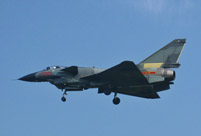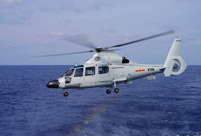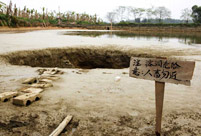


A warship sails in South China Sea during a Chinese navy drill in South China Sea, July 28, 2015.
It is not the business of the U.S. whether China establishes an Air Defense Identification Zone (ADIZ) over the South China Sea, said military expert Luo Yuan in an article published by China Youth Daily.
Luo's comments came after a report on Reuters citing the words of U.S. Deputy Secretary of Defense Robert Work on Wednesday. Work said that the U.S. told China it will not recognize an exclusion zone in the South China Sea, and would view such a move as "destabilizing" the area. The country will also not recognize the established ADIZ over the East China Sea.
Luo said that the South China Sea issue should be solved through negotiation between all relevant countries according to The U.N. Convention on the Law of the Sea (UNCLOS) and the Declaration of Conduct for the South China Sea. It is meaningless for unaffected countries like the U.S. to intervene.
Luo also said that the South China Sea issue was never so heated before the U.S. proposed its strategy of returning to Asia; he believes that the U.S. actually affected strategic unbalancing under the guise of strategic rebalancing. In addition, Luo said that the U.S. is a troublemaker on this issue, despite the fact that the country promotes freedom of navigation and demilitarization of the South China Sea. He claimed that the U.S. is intentionally driving a wedge between China and its surrounding countries.
Luo writes in his article that the U.S has little ground to stand on given that the country has not signed the UNCLOS agreement. The U.S. urges China not to militarize the area, while simultaneously sending military aircraft and warships to conduct reconnaissance.
When it comes to the role of the Philippines in this issue, Luo said that the territory of the Philippines was confirmed by the U.S. in the Treaty of Paris (1898), the Treaty of Washington (1900), and the Convention Between the United States and Great Britain (1930). Luo believes it is ridiculous for the U.S to help the Philippines claim additional islands in the South China Sea.
Luo also raised several questions in his article. First, he wonders whether the Philippines is provoking the situation by calling the South China Sea the "West Philippines Sea." He also asks whether the Philippines is changing its geographical appearance by constructing military runways on Zhongye Island. Furthermore, why is the U.S. paying selective attention to this region? Why did the U.S. not take issue when other countries dug nearly 1,000 oil and gas wells within China’s traditional sea boundaries, yet now the country takes issue with China digging a single well near Zhongjian Island?
Luo said that Work has no right to his stance as far as ADIZ is concerned. The purpose of ADIZ is to identify military and civilian aircraft and to maintain international aviation security. Why does the U.S. allow itself and other countries to set ADIZ but not allow China to do so?
Luo said that whether or not China chooses to set ADIZ is China's own business, and the final decision will be made according to the demands of national defense and stability in the South China Sea.
 The evolution of J-10 fighter
The evolution of J-10 fighter Top 10 Asian beauties in 2016
Top 10 Asian beauties in 2016 Train rides through blossoms
Train rides through blossoms North Sea Fleet conducts drill in West Pacific Ocean
North Sea Fleet conducts drill in West Pacific Ocean Breathtaking aerial photos of tulip blossoms in C China
Breathtaking aerial photos of tulip blossoms in C China Horrific: Pit swallows 25 tons of fish overnight
Horrific: Pit swallows 25 tons of fish overnight Police officers learn Wing Chun in E. China
Police officers learn Wing Chun in E. China Charming models compete in super model contest in Beijing
Charming models compete in super model contest in Beijing Beauties wearing Tang dynasty costume pick tea leaves
Beauties wearing Tang dynasty costume pick tea leaves Top 20 hottest women in the world in 2014
Top 20 hottest women in the world in 2014 Top 10 hardest languages to learn
Top 10 hardest languages to learn 10 Chinese female stars with most beautiful faces
10 Chinese female stars with most beautiful faces China’s Top 10 Unique Bridges, Highways and Roads
China’s Top 10 Unique Bridges, Highways and Roads My tiger mother controlled me with Chinese food
My tiger mother controlled me with Chinese food Shanghai court finds against maternity tourism company
Shanghai court finds against maternity tourism company Pranks under fire after video of celeb wedding shows actress harassment
Pranks under fire after video of celeb wedding shows actress harassment For foreigners, Chinese talent and reality shows offer a chance to hit it big
For foreigners, Chinese talent and reality shows offer a chance to hit it bigDay|Week